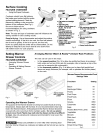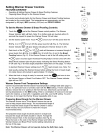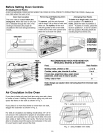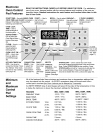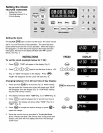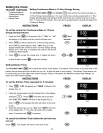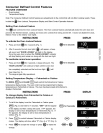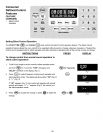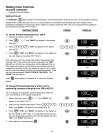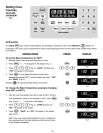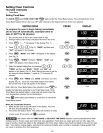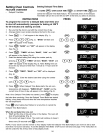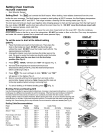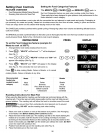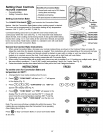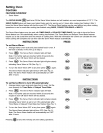
Setting Oven Controls
FEATURE OVERVIEW
Preheat for Electric Ranges
Setting Preheat
The PREHEAT _ pad controls the Preheat feature. The Preheat feature will bring the oven up to temperature and then
indicate when to place the food in the oven. Use this feature in combination with the Bake pad when recipes call for
preheating. Preheating is not necessary when roasting or cooking casseroles. The oven can be programmed to preheat at
any temperature between 170°F to 550°F.
INSTRUCTIONS PRESS DISPLAY
To set the Preheat temperature for 350°F:
1. Arrange the interior oven racks.
2. Press _. "- - - °" and "BAKE" will appear in the display
(See Fig. 1).
3. Press _@@. "350°" will appear in the display
(See Fig. 2).
4. Press (_. "PRE" and "BAKE" will appear in the display as
the oven heats and reaches 350°F (Fig 3).
Note: After the oven has reached the desired temperature (this
example, 350°F) the control wilt sound a long beep, the "PRE"
light will turn off and oven temperature will be displayed (Fig. 4).
If the beep was missed, a quick glance at the display with oven
temperature showing in the oven display is a good way to check
that the oven has already reached the preheat temperature. Once
the oven has preheated, PLACE FOOD IN THE OVEN. The
"BAKE" light will stay on.
Press @ when baking is complete or to cancel the Preheat
feature.
Fig. 1
To change Preheat temperature while oven is
preheating (example changing from 350 to 425°F):
If it is necessary to change the preheat temperature while the
oven is preheating to the original temperature:
1. While preheating, press _. "- - -°" and "BAKE" wilt
appear in the display (Fig. 5)
2. Enter the new preheat temperature. Press _@.
"425 °" and "BAKE" will appear in the display (Fig. 6).
3. Press (_. "PRE" and "BAKE" will appear in the display as
the oven heats to 425°F (Fig. 7). A long beep will sound once
the oven temperature reaches 425°F and the display will show
"425 °" and "BAKE" (See Fig. 8).
4. When baking is complete press @.
Fig. 2
Fig. 3
Fig. 4
QdbG>
®
Fig. 5
Fig. 6
Fig. 7
Fig. 8
21



